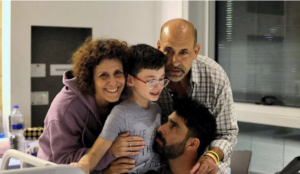Freed Israeli hostages offer glimpse of life in Gaza as Hamas’ captives

Ohad Munder, 9, with mom Keren meeting family members on return to Israel after being held captive in Gaza for 50 days, 25 November 2023
Yael Freidson reports in Haaretz on 27 November 2023:
Uncomfortable sleeping arrangements, poor food and monotonous routines, and one pleasant surprise – this is some of the feedback freed Israeli hostages have given about their 50 days in Gaza.
Forty Israelis have been released by Hamas between Friday and Sunday evening, in exchange for 117 Palestinian prisoners. The Israelis, all women and children except for one man with dual Israeli-Russian citizenship, have been telling families with loved ones still in Gaza about their conditions in captivity, and how the other hostages they encountered are coping. At least 196 other hostages are believed to be held in Gaza, with another batch set to be released on Monday.
The freed hostages have revealed that while most of the abductees were held in tunnels, others were kept in homes or other buildings above ground. Some of the hostages were passed around, spending their first days in captivity in private homes – before armed Hamas fighters took them to facilities controlled by the terror group.
One group of hostages said they were held in tunnels the entire time and that conditions were difficult in terms of lighting, food and other amenities. They noted that in the past two weeks, there was virtually no food and they had survived mainly on rice.
Another group, kept in what appear to have been safe houses, enjoyed better conditions. Their main concern, they said, was about being shelled. Those in the tunnels said they could hear the shelling above them.
Some of the abductees said they were able to follow Israeli media reports and knew what was happening in the outside world. For example, Ohad Munder, who turned nine while being held in Gaza, heard his family wishing him a happy birthday in an Israeli TV broadcast. Other hostages with him also wished him a happy birthday. He was released last Friday along with mom Keren and grandmother Ruth.
The hostages said Hamas had not abused them and that the daily routine in captivity was pretty much the same. Family members quoted them as saying the main difficulties included boredom and inactivity.
At some stage, one of the hostage groups was given a radio, which enabled them external events. At the same time, they said sleeping conditions were difficult – especially for the older hostages, who had to sleep on a mattress on the floor or on benches.
Merav Mor Raviv told The New York Times that her cousin, Keren Munder, told her “they were eating, but not regularly and not all of the time.” Rice and bread were their main meals.
She added that Keren and Ruth Munder both lost between six and eight kilograms (13 to 17 pounds) during their period in captivity. Mor Raviv also said the hostages slept on chairs pushed together, and that when they needed a bathroom break, they had to knock on their cell door and wait – sometimes for as much as two hours.
This article is reproduced in its entirety
